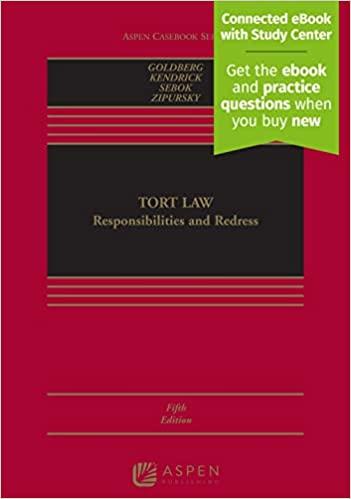Please answer parts A and B. I have added the questions in the comments
SoTired, a manufacturer from Bahamas, hired "We Move Cargo" (hereinafter referred to as WMC) to arrange for delivery of 20 containers of certain equipment from Bahamas to Los Angeles, CA., by "through" (i.e., end-to-end) transportation. The shipment was arranged as follows: SoTired hired shipping intermediary WMC to arrange for door-to-door transportation under a through bill of lading. WMC, like other transportation intermediaries of its kind, owned no transportation infrastructure, so it subcontracted the actual carriage to a Bermuda's ocean carrier, Bermuda Sun. Bermuda Sun (or its affiliate) performed the ocean carriage, but, because it owned no rail infrastructure, further subcontracted the rail carriage to "We Ship North" (hereinafter referred to as WSN). The bill of lading that WMC issued to SoTired designated Miami, FL, as the discharge port and Los Angeles, CA, as the ultimate destination, and set WMC;s liability limitation lower than the cargo's true value, using the default liability rule in the Carriage of Goods by Sea Act (COGSA) (about $500.00 per package) for the sea leg and a higher amount for the land leg. The bill also contained what is known as a "Himalaya Clause," which extends liability limitations to downstream parties, including, here, "any servant, agent or other person (including any independent contractor)." SoTired separately insured the cargo with "We Like Insurance" (hereinafter referred to as WLI). When WMC hired Bermuda Sun to transport the containers, Bermuda Sun issued its own bill of lading to WMC, designating Miami, FL as the discharge port, and Los Angeles, CA as the ultimate destination. Bermuda Sun's bill of lading also adopted COGSA's default rule, extended it to any land damages, and extended it in a Himalaya Clause to "all agents . . . (including inland) carriers . . . and all independent contractors." As noted earlier, Bermuda Sun hired "WSN" to transport the equipment by rail from Miami to Los Angeles, CA. After a very short and insubstantial transportation by sea (just over 100 miles and 3 hours from Bahamas to Miami), the cargo was loaded on a train. Unfortunately, 4 days and over 2000 miles later, WSN's train derailed around Denver, causing an alleged $3 million in damages. WLI reimbursed SoTired for the loss and then joined SoTired in suing WSN in a court with a proper jurisdiction, WSN responded that, among other things, SoTired's potential recovery could not exceed the liability limitations in the two bills of lading (ex. about $500 per container. SoTired argued that protections in bills of lading do not extend to WSN. After considering all pertinent facts, the question before you is: Did the liability limitations of the bills of lading extend to WSN, the railway carrier? Please answer the following







